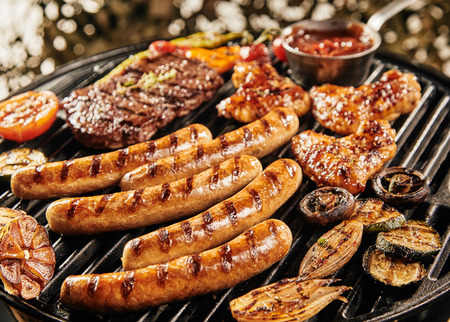
Fire Up the Grill
Posted: June 13, 2017
Summertime is in the air! It’s time for firing up the grill for burgers and dogs!! But before you pullout the charcoal and grilling accessories, take a minute to consider how to cook your meat properly. According to the National Cancer Institute, grilling your meats at high temps can cause potentially cancer-causing chemicals to form although no conclusive evidence has been found in humans.
So don’t step away from the grill just yet…just learn how to do it safely. Follow these 7 safety measures to ensure properly cooked meats:
- – Use lean meat instead of fatty meats. Meats that contain more fat content tend to have higher carcinogen concentrations when cooked, compared to leaner meats. A carcinogen called polycyclic aromatic hydrocarbons, or PAHs, is released when the fat drippings from the meat mix with the fire. It’s best to keep in mind that less fat means less dripping and less carcinogens are released. If you are feeling adventurous and want to try leaner meat, try ground lamb to replaces your traditional ground beef burger.
- – Handle chicken very carefully. While the National Chicken Council said in a statement that it is not aware of research linking grilled chicken to “anything cancer-causing,” it did caution that poultry should be kept refrigerated until ready to cook. Do not rinse raw poultry in your sink because it won’t remove bacteria and can spread raw juices around your sink, the Council warned. Use one cutting board for fresh produce and a separate one for raw meat, poultry and seafood. And when grilling chicken outdoors, don’t place cooked chicken on the same plate used to transport raw chicken to the grill.
- – Marinate or season your meat ahead of time. Instead of making your burgers and setting them right away on the grill, let the meat mixture marinate in the fridge for a few hours. Allowing the meat to sit and rest helps it to absorb the antioxidants in the herbs and spices.
- – Grill on LOW. Reducing the temperature of your grill, avoiding lengthy cooking times and keeping your meat away from direct exposure over an open flame or a hot metal surface can all help reduce PAH and HCA formation. Limit your charring and splatter by grilling over medium heat rather than a high flame.
- – Clean your grill…ALWAYS! Black is risky, so removing charred portions of meat and refraining from using gravy made from meat drippings also helps.
- – If time permits, pre-cook in the oven. Saves time and pre-cooking meat, prior to exposing to the grill, helps reduce the amount of time it sits a high temps.
- – Mix it up by adding veggies. Grilled veggies don’t harbor the same types of cancer risk. This allows for smaller cuts of meat and reduces cooking time.
Additional Resources:
https://www.cancer.gov/about-cancer/causes-prevention/risk/diet/cooked-meats-fact-sheet

